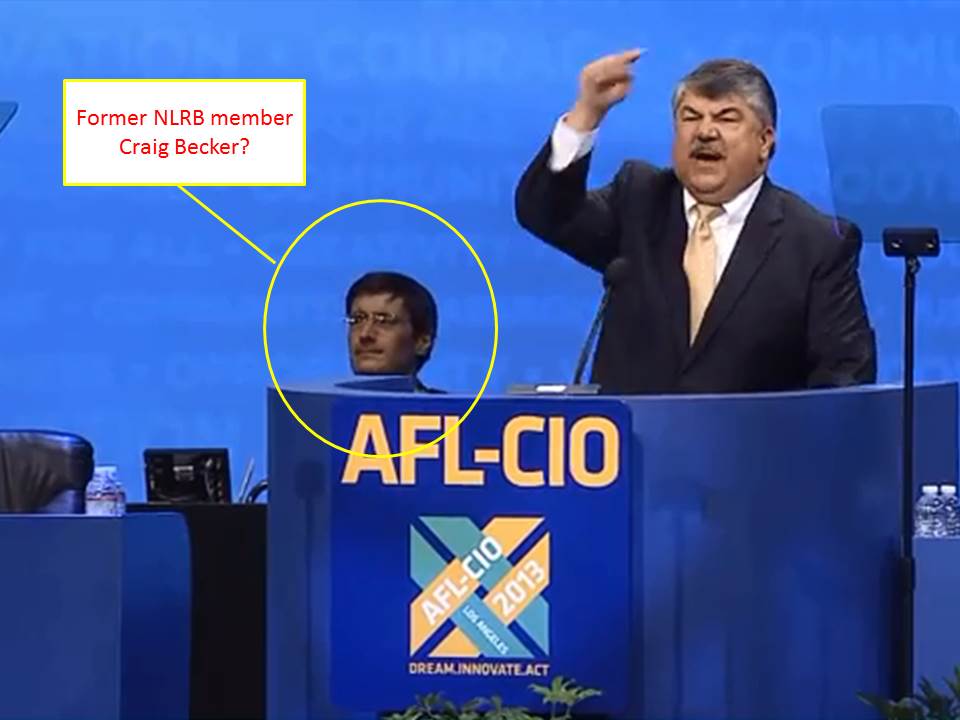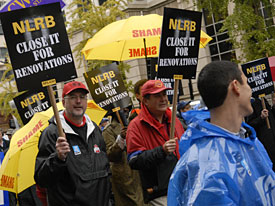
As unemployment continues to rise as a result of the Obama administration’s anti-business climate, the union-controlled National Labor Relations Board is about do what a Democrat-controlled Congress could not do—give unions the ability to kill unionize more companies.
We’ve known this was coming for a while now, but after union bosses blew a few hundred million of their members’ money trying to save what Democrats they could on Tuesday, they now know that their number one legislative agenda item, the Employee Free ANTI-Choice Act is all but dead. Union bosses don’t seem to be too upset though. Why should they? After all, they’ve already engineered Plan B and, now, they’re ready to implement it.
Union leaders on Wednesday said they would focus their efforts on regulatory agencies that govern labor and union-organizing matters, and push for job-creating programs such as new infrastructure projects.
That means unions will turn their attention toward agencies such as the Department of Labor or the National Labor Relations Board, now that there’s little hope Congress will act on legislation such as the Employee Free Choice Act, a bill that would make it easier for unions to organize without secret ballot elections.
[snip]
The NLRB doesn’t have the authority to overhaul labor law, but it could make administrative changes to shorten the time between when a union files for a unionization election and when the election is held at a company, a change unions say is needed to cut down on unfair anti-union pressure tactics by employers.
Gridlock in Washington could compel unions to put more resources into organizing new members, especially low-wage laundry and restaurant workers, and those in health care where unions have had recent successes, labor experts said. They might use more campaigns to allege unfair labor practices at companies, and work more with international unions.
Who needs EFCA when unions control the NLRB?
On October 21st, though not widely reported in the media, NLRB-member Mark Pearce shocked the employer community when he indicated that the union-controlled agency is interested in Canadian-style union elections. Under the Canadian system of “snap elections,” voting takes place within 5 to 10 days once an employer is notified that a union is organizing his workforce. This process gives unions a tremendous boost in the union win rate during union elections. The problem is, here in the U.S., unions already win the vast majority of elections anyway.
For the last several years, the union win rate of secret ballot elections has steadily increased to around 70%. During that time, the unions’ ever-increasing win rate has been accomplished when the average election time frame from petition to the actual NLRB election has been around 38 days. If the NLRB moves toward 5-10 day elections, the union win rate would likely increase to 90% or better.
As former NRLB member John Raudabaugh warned last week:
…[T]he reduced voting period would allow unions to organize in secret for weeks or months and spring last-minute elections on unknowing employers, especially when no “agitated state” to spur on unionization exists. Most of these employers run smaller businesses without a legal department of their own, so they do not necessarily know the rules.
“Many are started really rather below the surface attracting the core interested persons and they gain momentum,” Raudabaugh said. “It takes time sometimes if there’s not a real issue motivating people to coalesce. They take weeks, months to develop a core constituency and the employer may not be aware.”
This lends itself to a situation where employees are only hearing one side of the unionization story.
The Union Tax.
At a time of extraordinarily high unemployment and jobs still moving overseas, the Obama administration and its union backers seem oblivious to the fact that unions simply cost jobs to be lost. In fact, studies have indicated that unionization alone (not counting wages and benefits) can increase a company’s operating cost by as much as 25%.
As far as annual expenses for an organization with a union presence, [human resource consultant] Jim Gray estimates that the total additional operating costs (over a union-free company) range from $900,000 for a company with 100 employees to more than $4,000,000 for a company with as many as 2000 employees. These amounts do not include wages and benefits, but do include items such as additional training for managers, additional Human Resources support, attorney’s fees, cost of arbitrations and handling of grievances, plus negotiations, lost productivity, strike planning, security, and lost sales margin, as well as a number of other items.
Extending the research out to 10 years post-unionization, the Employment Policy Foundation (EPF) stated that a unionized company’s output per employee would be 2.4% less than a union-free competitor, if that unionized company experienced just a .25 percent reduction in productivity. Their conclusion was that unless the unionized company could sell their product at a higher price or other cost savings could be attained, the unionized company is likely to see 14 percent less in profits per labor hour than their non-union competitor.
Today, while many larger companies have human resource departments whose job it is to measure and address employee satisfaction, thereby making them less vulnerable to unionization, many smaller companies do not. As a result, small businesses are more likely to be targeted and picked off by union organizers which will likely result in more jobs being lost in the one area where job creation is usually more robust when there is an economic recovery.
As Democrats (and unions) learned earlier this week, America is tired of anti-business forces like unions whose policies are killing job creation. If the Obama NLRB intends to cater to its union bosses’ wishes and further destroy more jobs by making unionization easier, it will only anger an already angry electorate as unemployment stays unacceptably high for years to come.
__________________
“I bring reason to your ears, and, in language as plain as ABC, hold up truth to your eyes.” Thomas Paine, December 23, 1776
For more news & views on today’s unions, go to LaborUnionReport.com






“…here in the U.S., unions already win the vast majority of elections”. I’m amazed; this is true in North Carolina too?
If unions “win” the “vast majority” of elections, then why is union membership in such steep, long-time decline? Or is that incorrect, union membership is in fact, increasing? I thought the unions just lost AGAIN at Delta?
The problem for unions is that the number of jobs lost has far surpassed the number of companies they can unionize (which is why EFCA was such a big deal for them).